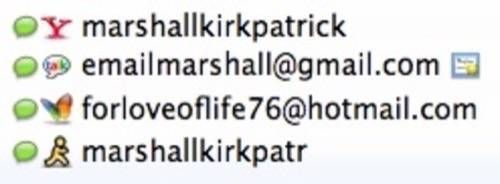The number of people whose work is touched by the internet these days is hard to imagine. Many of us have been working full-time online for a while, but for the vast majority of people online today that’s not the case. Here at RWW we communicate with people with a wide range of experience working online every day.

We’ve noticed that many people don’t use some tools that would make their lives online much more effective and efficient. Here’s our list of some tools we’d suggest are essential. Several of these tools will deliver huge value to your workday and take less than 10 minutes to get set up. Some will be obvious to full time web workers, but some suggestions may not be. They include: a multi-service IM client, cross platform screensharing tool, a custom search engine, a startpage and a blog with contact info.
Multi-service IM
Many people only have an active account with one IM service, often AIM or Yahoo! Messenger. It’s nice to not be that person when you want to have an IM conversation. There are a number of applications that will sign you in to accounts on all the major IM platforms every time you open the app. Everything can be made easier with IM, especially phone calls where URLs can be shot back and forth with ease.

By using a cross-service IM client, you’ll never have to miss out on an IM conversation with someone else who only has an account on one service.
The first step is to take a few minutes to set up IM accounts on AIM, Yahoo! Messenger, Windows Live Messenger and GMail.
Then, get an IM client that will log you into all of those accounts at once. If you’re on a Mac check out Adium, on Windows try Miranda. Once you take a few minutes to get this set up, you’ll never go back.
Cross Platform Screensharing Tool
WebEx is like Kleenex (a brand name, that is) but it’s not the only option for screensharing. Older Macs have a hard time using it. It’s really clunky and people who pay for it say it’s expensive. None the less, it’s really nice to be able to let someone view your screen for a real-time demonstration.
The Mac to Mac screen sharing that iChat offers is really nice, easy and powerful. For the rest of the world though, there’s a variety of options. I’ve been using Yugma lately and it works well for Mac to Windows sharing. Many people really like Yuuguu. What are your favorite tools for this? Whenever I’m looking for a popular way to do almost anything, I start by looking at a URL like http://del.icio.us/popular/screensharing.

A Custom Search Engine
Google Custom Search Engine lets you paste in a list of URLs and create a “miniature search engine” that brings back results only from those URLs you’ve selected. I use these all day long, every day. The next time you think “Damn, Marshall sure took some time to research details on this post” – you can know now that it was really just my Custom Search Engines at work.

Here’s how you do it. Select some key news and reference sites in your field and set up a CSE for them, drop a link to it in your toolbar and use it whenever you can remember to. It’s like an all-natural brain augmentation. My best personal custom search engines are closely guarded resources but try out some of these that we’ve posted here at RWW and imagine the possibilities. Check out our Mac Rumor Blogs CSE, US Government Watchdog Organization CSE and our very useful CSE of 100 Productivity Sites. You may not work in any of these fields, but ask yourself what the key reference and news sites are in your field and throw them in a CSE. It’s super easy.
Is it a stretch to call a CSE essential? Use one for awhile and I think you’ll agree that they really can become a key part of your use of the internet. The ROI of employing this tool is higher than almost anything else on the internet, honestly. I can’t think of any knowledge worker, in any field, that wouldn’t benefit greatly from a well-constructed Custom Search Engine. You can probably make one for yourself in less than 10 minutes.
Startpage
Every place I work I set up an RSS startpage for myself and my co-workers. Consulting clients, non-profits, anybody I can get my hands on gets a startpage before I’m done with them. I usually use Netvibes just because it’s easy to share pages, the OPML handling is pretty good and the mobile version is great. The new Ginger version breaks sharing for some people, though.
I put the highest priority RSS feeds that I subscribe to on that startpage, then put a link to it on my browser toolbar. I click on that maybe once an hour and see if these top sources have anything new. It’s quick and easy, much easier than opening up a whole feed reader.

What works well on a startpage? Depending on your job, some things are more important than others to be updated on frequently. Here’s what I put on startpages:
Top blogs in your niche
Vendor blogs, press releases
search feeds
* ask.com for blogs, yahoo and/or topix for news, live.com for web if you like, Summize.com for twitter
* try searching for your org name, link to your site, top exec names, competitors names, key terms?
Blog With Your Name and Contact Info
This might seem silly, but everyone should have a blog of some sort. A dynamic web presence with biographical and contact information on it. A search engine-friendly place to let the world know what you’re interested in and how to get in touch with you. That’s not crazy, it’s a real good idea.
Blogging can take more time and energy than most people are willing to expend. How about using Tumblr or putting FriendFeed on a page with your contact info? (Like Robert Scoble does.) However you can get timely, pertinent content up on the web next to your name – you should do it. It’s a great way to demonstrate your engagement with your field and your intelligence. If done well, that’s far better than most resumes. It also provides great context for people who are just starting to interact with you.

I put my phone number on my personal blog, and I write for the 11th most linked to blog on the web. I get maybe 3 unwanted phone calls a week as a result. That means that just about anyone else should be able to put their phone number and IM on their blogs as well. It’s so convenient to be able to get a hold of people in a hurry. When an opportunity arises, do you want to be easy to reach or do you want that opportunity to be taken by someone else who is? Undoubtedly this is a calculation that’s clearer for people less subject to harassment based on gender or race, but except in complicating circumstances your personal contact info should be available online if at all possible. Bad things are unlikely to happen.
Conclusion
Those are some of the tools we find most important to use, and that we wish more people we interacted with used. The difference between working with powerful tools and working without them is huge. What would you add to or subtract from this list?
Tools photo by Flickr user geishaboy500. Thanks for using Creative Commons licenses!
















